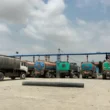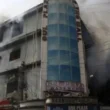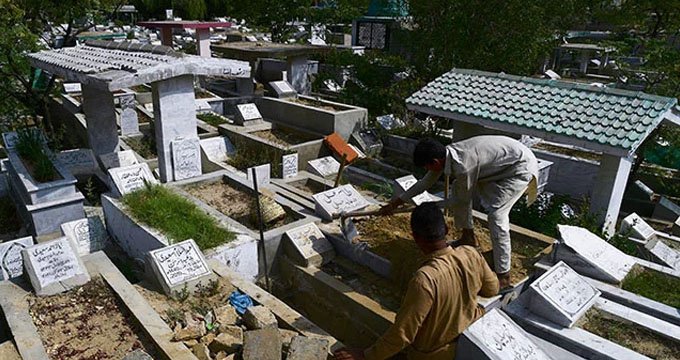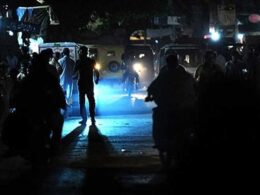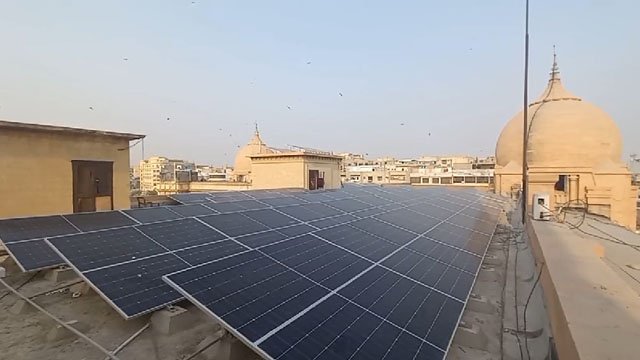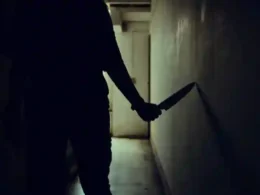Karachi, a bustling metropolis filled with gleaming high-rise buildings, is home to over 25 million residents while the city thrives with its modern infrastructure, it faces a growing crisis when it comes to graveyards or cemeteries.
Despite the towering buildings, the residents find themselves struggling to secure even a two-yard grave for their loved ones.
Living conditions have already become challenging, and now, many citizens are deeply concerned about what will happen after death, as burial space continues to shrink with graveyards filling up and the population rapidly increasing, the issue of where to bury the deceased is becoming a serious and urgent problem for the city’s future.
How much does a funeral cost in Karachi?
Statistics show that the cost of burying a poor person in Karachi’s suburbs ranges between Rs 40,000 and Rs 50,000. For the middle class, the cost is between Rs 65,000 and Rs 80,000, while for the upper class, it can go up to Rs 100,000 to Rs 150,000.
Additionally, if a family wishes to bury their loved one in a specific graveyard or preferred location, the cost can increase by Rs 50,000 to Rs 100,000, with the cost of the grave itself reaching Rs 100,000 to Rs 150,000.
By 2040, 40 percent of the 220 cemeteries in Karachi are expected to be full.
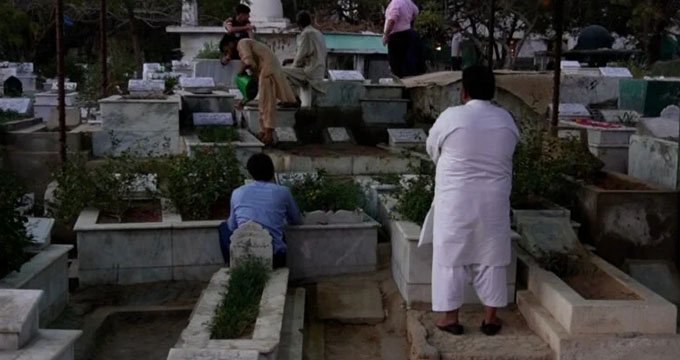
The shortage of space in cemeteries is becoming a critical issue, especially with the rising annual death rate.
Around 200 acres of land will be needed for graves each year without urgent government intervention, burying over 100,000 people annually could become a serious problem.
In some cemeteries, mafias impose arbitrary charges for burials, ranging from around ten thousand rupees to lacs.
What are the Graveyard fees in Karachi?
The largest cost associated with burial is the cemetery fee, in registered or organized cemeteries, the expenses are fixed.
For graveyards managed by the Municipal Corporation, the certificate fee is Rs 300, and the gravedigger’s and burial costs amount to Rs 9,000 (with the gravedigger being unofficial).
According to the Municipal Corporation of Karachi, fees for registered social organizations, institutions, communities, and government military cemeteries vary, but the total burial cost in the DHA cemetery is Rs 9,300.
In unorganized cemeteries, there is often no fixed fee, and families typically manage the burial and grave arrangements themselves.
On average, additional fees ranging from Rs 5,000 to Rs 35,000 are charged at most cemeteries in the city. If families prefer a specific grave location or wish to be buried in an officially closed cemetery, the fees can rise significantly, ranging from Rs 70,000 to Rs 150,000.
Does people offer blank cheque for grave space?
During the report’s preparation, it was discovered that people are willing to offer large sums of money to secure burial spaces in graveyards where burial is typically prohibited or in cemeteries of their choice.
These amounts can range from the government-fixed expense of Rs 9,300 to millions of rupees.
Sources have revealed an incident at a society cemetery where a gravedigger was handed a blank check and asked to fill in the amount, with the sole request being to secure a grave space.
How to find rate list of graveyards?
Cemeteries managed by various institutions or individuals generally have fixed expenses, while the fees for graves, whether for children or adults, are the same in both public and private graveyards.
Official rates and guidelines from the Sindh Assembly are displayed at cemeteries under the Karachi Metropolitan Corporation (KMC), where staff are also present to oversee operations.
Similarly, other public and private cemeteries have staff monitoring them. However, many cemeteries, particularly public ones, have become hotspots for criminal activities due to the involvement of various mafias.
These areas often attract drug addicts and anti-social elements, creating an environment of lawlessness.
Other expenses for deceased before burial
Additional burial expenses in Karachi can add up significantly, including transporting the deceased from the hospital to the home costs around Rs 2,000.
In hot weather, ice is required, costing Rs 1,000 to Rs 1,500 while the other essentials, such as awning, chairs, and miscellaneous items, can cost between Rs 5,000 to Rs 25,000.
If the burial is delayed, transporting the deceased to cold storage costs Rs 2,000, with daily storage charges ranging from Rs 1,000 to Rs 2,500.
The shroud typically costs between Rs 2,500 to Rs 5,000, while the cost of the bath mat, perfume, camphor, and other accessories ranges from Rs 2,000 to Rs 7,500.
The person responsible for bathing the deceased charges around Rs 1,000, and moving the body from cold storage to the house costs Rs 2,000.
A coffin carrier bus or can cost between Rs 1,500 to Rs 5,000 per vehicle, while flower, leaves, rose water, and incense sticks range from Rs. 2,000 to Rs. 5,000. Serving lunch or dinner and drinks to mourners costs Rs 11,000 to Rs. 18,000.
Furthermore, if the family observes further religious rituals such as the third, tenth, Chehlum, or anniversary, each event carries its own separate costs, typically between Rs 20,000 and Rs 50,000.
These mandatory and social rituals often place a heavy financial burden on families, with many struggling to manage the expenses, sometimes leading to debt, especially for the poorer sections of society.
Real challenge for Karachi?
Karachi, already grappling with severe challenges due to its growing population, now faces a new crisis, which is the lack of space for burials.
Gravediggers, taking advantage of the city’s dire situation, have been demanding exorbitant fees for burial.
Complaints have also surfaced about the demolition of old graves to make room for new ones are also very common in several graveyards of Karachi.
On November 26, 2024, during a Public Accounts meeting of the Sindh Assembly, Committee Member Khurram Soomro revealed that ghost employees from the Karachi Municipal Corporation (KMC) are posing as gravediggers and selling grave spaces for up to Rs 40,000 each.

How many graveyards in Karachi?
According to the statistics obtained from various sources, approximately 220 cemeteries are found in Karachi, including both large and small.
Out of these, 192 are designated allotment cemeteries, with 173 allocated for Muslims and 19 for non-Muslims.
Among the non-Muslim cemeteries, 12 are Christian burial grounds, and 5 are Hindu crematoriums.
The management of these allotted cemeteries is divided into different authorities with 46 are overseen by the KMC, 20 managed by the DHA, various cantonments, and government institutions, while 112 are under the control of various social organizations, communities, and private institutions (99 Muslim and 13 non-Muslim).
Additionally, about 14 cemeteries are managed by individual institutions or private entities, while the sources claimed that there are around 30 unregistered and unorganized cemeteries scattered throughout the city.
Lack of attention to graveyards in Karachi:
According to Ali Hassan Sajid, Senior Director of Information, Printing, and Media Management, Karachi’s population was around 300,000 at the time of Pakistan’s creation, but it has since grown to over 25 million.
As the population has increased, more people desire burial facilities closer to their homes or to their relatives’ graves, so that family members can easily visit and perform rituals like reciting Fateha.
However, despite the rapid population growth, basic burial facilities have not kept pace.
In the past, cemeteries were often neglected, leading to both a shortage of burial space and deteriorating conditions in many cemeteries.
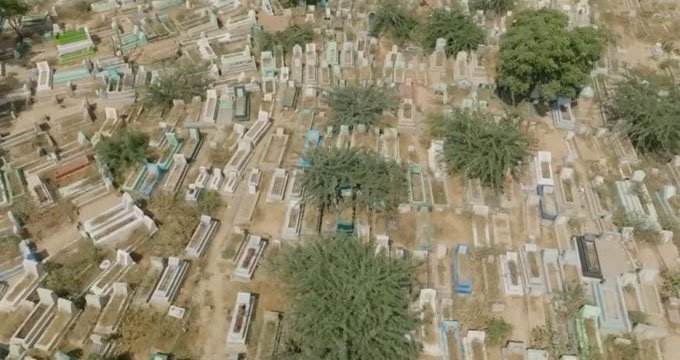
Mini Pakistan
Karachi, the economic hub of Pakistan, holds the distinction of being the country’s first capital and is often referred to as “Mini Pakistan” due to its diverse population.
It is the most densely populated city in the country, with residents from every division, district, tehsil, and sub-division of Pakistan’s four provinces, as well as from the federal capital Islamabad, Azad Kashmir, and Gilgit-Baltistan.
What is total population of Karachi?
According to the official results of the first digital and seventh census of 2023, the population of the Karachi division stands at 23,828,881, with a growth rate of 4.10 percent.
However, claims from Karachi’s government, as well as various social and political stakeholders, suggest that the city’s population ranges between 25 million and 35 million.
On the other hand, impartial observers and experts estimate that Karachi’s population in 2024 will be closer to approximately 23 million.
What is mortality rate in Karachi?
According to the Pakistan Bureau of Statistics (PBS), the birth rate in 2020 was 27 children per 1,000, while the death rate stood at 6.7 people.
However, a United Nations (UN) report noted that Pakistan’s death rate increased to 7.2 people per 1,000 in 2021. In Karachi, the estimated number of deaths annually ranges from 150,000 to 250,000.
Urban planning expert Dr. Muhammad Toheed points out that accurately determining the mortality rate in Pakistan is challenging due to the lack of systematic and coordinated registration across the National Database and Registration Authority (NADRA), Union Councils, hospitals, and cemeteries.
It is also claimed that Karachi’s mortality rate is higher than the rest of the country.
Cemeteries of other religions in Karachi
According to Ali Hassan Sajid, Senior Director of Information at the Karachi Metropolitan Corporation (KMC), Karachi has historically had cemeteries for Muslims, Hindus, Christians, and Parsis, with a small Jewish community also residing in the city.

Encroachment on graveyards
The Sindh government and KMC have allocated graveyards to social organizations, communities, and institutions in the low-lying or undeveloped area of Mowach Goth.
However, several stakeholders claim that the relevant authorities are not providing them with land as promised, meanwhile, the officials have stated that these graveyards are being encroached upon, with plots being encroached.
Similar complaints have surfaced around various graveyards throughout the city.
KMC Director Ali Hassan Sajid mentioned that the KMC has taken action against the mafias operating in different areas but these groups reorganize and resume their illegal activities.
Sealed graveyards in Karachi
KMC has imposed a ban on burials in six major graveyards across the city, including Society Graveyard on Tariq Road, Model Colony Graveyard in Malir, Paposh Nagar Graveyard in Nazimabad, Korangi No. 6 Graveyard, Yasinabad Graveyard, and Azeem Pura Graveyard in Shah Faisal Colony.
This decision comes in response to complaints regarding the demolition of old graves and the construction of new ones, as these cemeteries have run out of available burial space.
Emergency Measures
Most cemeteries in Karachi, especially in the central areas, have nearly exhausted their burial space, leading to a surge in complaints about the unavailability of plots for the deceased.
In response to this issue, Mayor Karachi Barrister Murtaza Wahab stated that the KMC has established three new cemeteries in different areas of Karachi including Baldia Town, Northern Bypass, and Link Road (located between Super Highway and National Highway).
While the municipal efforts are commendable, however, remain insufficient given the increasing demand.
Experts, such as senior journalist Mohammed Muneeruddin, emphasize the need for urgent action, urging the authorities to allocate burial space across 25 towns of Karachi to avoid a grave crisis by 2040.
Protecting graveyard lands and enforcing strict regulations to prevent the demolition of old graves and the illegal construction of new ones is crucial for the city’s future.
NOTE:
Times of Karachi (TOK) has gathered detailed information for its readers through surveys conducted at cemeteries, flower shops, shroud vendors, and other accessory stores.
The compilation also includes insights from local residents, culinary centers, and direct communication with Edhi and Chhipa Cold Storage across various areas of Karachi.

